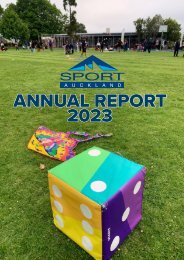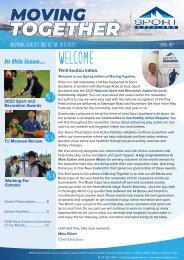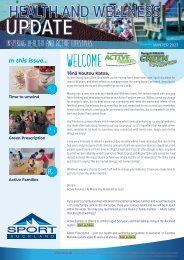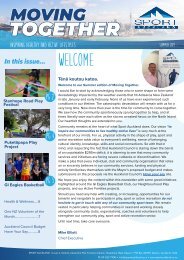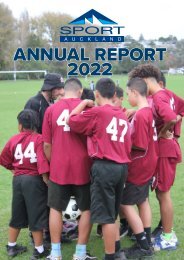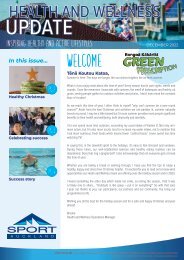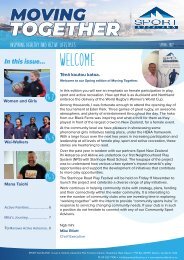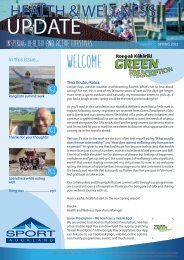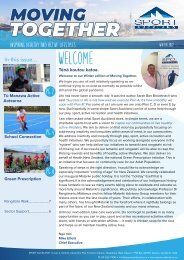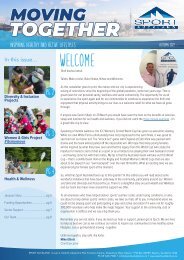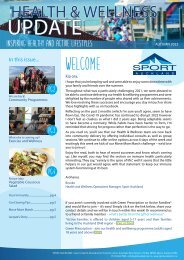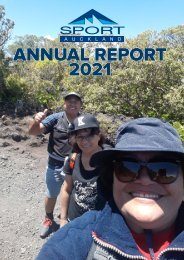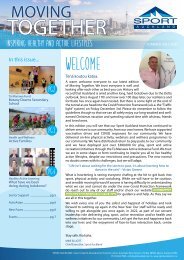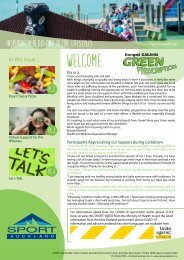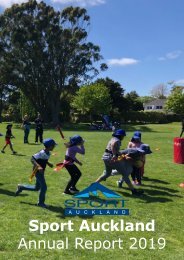Annual Report 2018
Create successful ePaper yourself
Turn your PDF publications into a flip-book with our unique Google optimized e-Paper software.
MESSAGE<br />
from our Chair and CEO<br />
It is with great pleasure that we present our 26th <strong>Annual</strong> <strong>Report</strong> to our stakeholders. At the beginning of the year, based on<br />
community needs and operational strategies, we laid out our roadmap of work that we were going to undertake (Our Focus<br />
<strong>2018</strong>). This roadmap guided critical thinking in the Boardroom and amongst partners and funders alike.<br />
Year end reflection on how far we have travelled reveals an achievement of 76% of Our Focus <strong>2018</strong> (13/17). While that result<br />
was very pleasing we acknowledge there is room for continuous improvement, which we will embrace.<br />
Throughout the year our discussions and thinking affirmed that the sport, active recreation and health and wellness sectors<br />
are in the midst of very interesting and challenging times. Our vision of “Inspiring our Communities to Live Healthy Active<br />
Lifestyles” could not be more apt at a time when physical inactivity, obesity and mental health issues are on the rise and the<br />
Auckland metropolitan region is squeezed for spaces and places to participate in physical activity. We have a growing diverse<br />
population that is consuming sport and physical activity in completely different formats to traditional offers. We have a new<br />
coalition Government focussed on measuring the well-being of our people. Health and wellness, with little or no reference to<br />
sport, is now front of mind for our nation. The common language, internationally, is to speak of the importance of physical<br />
activity.<br />
Richard Bailey, writing in the Huffington Post (2016), stated:<br />
“Physical inactivity is a major public health issue, and there is an urgency to find sustainable and affordable ways of<br />
getting the world moving. Large numbers of people are inactive to the extent that they risk their health, and while it is<br />
often assumed that this is a problem of the West, it has now spread into every corner of the globe. Some describe the<br />
current situation an inactivity pandemic.”<br />
Anecdotally some commentators will tell us we have not made enough significant inroads into that pandemic. For Sport<br />
Auckland to remain relevant and true to our vision our Board have highlighted that physical activity, more than ever before,<br />
can be one of the positive vehicles that can help drive social, educational and health outcomes for our communities and for<br />
our Government in an effort to reverse the inactivity pandemic.<br />
That is why as part of our strategic thinking we have aligned our work to that of our partners’ (Aktive, Sport Waitakere,<br />
Harbour Sport, CLM Community Sport, Auckland Council, Local Boards, Auckland District Health Board, Counties Manukau<br />
District Health Board, Foundation North, Lion Foundation and NZCT) with an emphasis on shifting the needle forward to<br />
increase physical activity levels within our communities. Our Board has determined that, with limited resources, partnering<br />
and collaborating is the operating model of the day. We take this opportunity then to sincerely thank all the above named<br />
organisations for their support and for the investment they have given us to help achieve our intentions for our communities.<br />
To be impactful, our work has had to be more targeted than ever before. We are focussed on ensuring our Young People, per<br />
se, are given quality experiences and opportunities that will ensure that they have a life-long love of physical activity. This<br />
has meant understanding the Physical Literacy framework which relates to the holistic development of each individual at the<br />
various stages of their lives. The holistic view takes into consideration an individual’s physical, social, emotional, cognitive<br />
and spiritual needs. It means that providers of sport and physical activity need to be aware that they themselves need to have<br />
a clear understanding of the Physical Literacy framework and rethink how they deliver their offerings in the market.<br />
6 <strong>Annual</strong> report<br />
<strong>Annual</strong> report<br />
7



